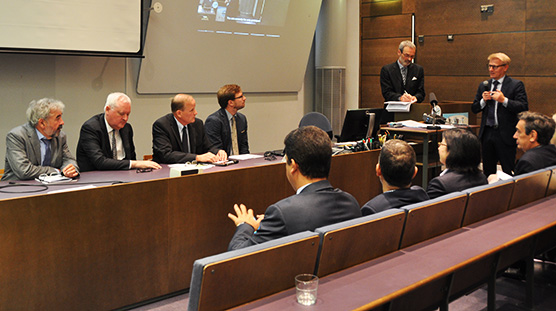
Minister Kimmo Tiilikainen asking questions from the expert panelists. Photo: Suvi-Anne Kinnunen
The topic of burden-sharing in the EU after the Paris agreement and the role of forests in mitigating climate change will be key issues for further climate negotiations both in the EU and in the wider global climate negotiations. The French, German and British Embassies, SYKE and the Strategic Research Council therefore organized a seminar "After Paris: burden-sharing and the role of forestry in climate change mitigation". The seminar in Helsinki was part of the worldwide Climate Diplomacy Week from 12th to 18th September 2016.
The seminar sought to highlight whether the European Commission’s proposal on integrating forest sector into the EU 2030 Climate and Energy Framework is fit for purpose and to discuss the relevance of the European solutions on the role of forests in mitigating climate change for the global models to advance the Paris agreement.
The introductory speech was given by the Finnish Minister of Agriculture and the Environment, Mr Kimmo Tiilikainen who stressed that Finland wishes to among the leaders in mitigating climate change and also in the sustainable management of forest. He showed how Finland has achieved a considerable sink while at the same time also using forests. Minister Tiilikainen has found several positive features in the Commission’s proposal, but stressed that Finland wishes to see accounting rules that provide greater rewards for those countries that have developed and maintained sinks.
In the first session the experts reflected on key features of the EC proposal in relation to the diversity of forests and forestry across Europe.
Jan-Marc Guehl of INRA highlighted the diversity of the French forest, with part of the forests potentially suffering from climate change. Currently the sequestration of carbon in the French forests corresponds to about 15 % of the French emissions, not counting the effect of substitution of fossil carbon. In a dynamic future scenario the direct sequestration could be reduced, but instead the storage in wood products and in substitution could be increased so that the total contribution to mitigation could be increased.
For France future policies affecting forest and forestry need to stress both adaptation to climate change, the optimization of the used of wood by cascading effects (material for construction, recycling, energy), and taking into account the preservation of biodiversity.
Robert Matthews of the Forest Research, UK, reflected on some of the potential challenges of the EC proposal. One important issue is how to treat the long term benefits of forest once afforestation has been achieved. Specifically Robert Matthews noted that it “is not clear that proposed accounting rules would recognise longer-term benefits (after a fixed period, afforested land changes status to ‘existing’ forest).” This is partly the dilemma experienced by the forested countries such as Finland.
Robert Matthews also brought out the tradeoff between increasing the use of forests and maintaining the sink function. For a country with small own forest resources it is also to consider how the EC proposal will affect co-operation amongst actors to achieve desired outcomes (i.e. bioeconomy development, promote forest carbon).
Hannes Bötcher of the Öko-institut in Germany pointed out that the land use and forest sector plays a relatively modest role in mitigation in Germany compared with the overall emissions. He identified five important challenges that the EC proposal faces, i.e. the transparency in accounting, the reliability in monitoring, the wider environmental integrity, the actual implementation to achieve mitigation of climate change and the issues of cross compliance that arise from multiple uses of land and forests.
Hannes Böttcher noted there the EC proposal still provides a complex set of accounting rules. This implies that the burden increases of monitoring increases, which will be a challenge especially for poorer countries. For environmental integrity one challenge is that bioenergy accounting is hidden in the reference level. For implementation an open question is how to achieve stronger incentives, for example in relation to Harvested Wood Products. Finally Hannes Böttcher noted that the proposal cannot be expected to provide the full framework for the forest sector at the EU level and thus policy coherence is an issue.

Lauri Hetemäki reflected on the topic from a European forest perspective. He pointed out that the forest sector can provide an important role in mitigating climate change in Europe – more than 20 % of current emissions could be mitigated through a combination of forest management, forest area expansion energy substitution and the establishment of forest reserves. This can be achieved through a recognition of country differences, including the tailoring of policies and incentives at the regional level, finding synergies between climate and other benefits to be obtained from bioeconomy, biodiversity, recreation, and a conciliation of mitigation with adaptation.
The forests and forest sector would contribute to mitigation through sinks, substitution and storage. Lauri Hetemäki stressed that the current EC proposal does not fully support an optimal use forests and forest sector by maintaining a cap that limits the use of full potential and by failing to strengthen the links to cobenefits.
In the discussion that followed Minister Tiilikainen challenged the panel to find an optimal solution that could be used to develop the Commission’s proposal to become, generally acceptable, progressive in terms of climate impacts and effective in providing incentives for developing sustainable forestry. Other comments were raised on the need to be careful with concepts such as substitution, and on the details of the accounting for sinks. The panel emphasized the need to see the diversity in European forests and forestry and also the importance of recognizing both trade-offs and important links to adaptation.
The latter part of the seminar was devoted to the global policy dimensions of forest and forestry. An important question is how European solutions on the role of forests in mitigating climate change can provide suitable models for advancing the Paris agreement?
A starting point is that currently the global net forest sink corresponds to 14 % of the global emissions of fossil carbon dioxide. The emissions from the tropical deforestation significantly reduce the global sink of forests. Initiatives to achieve “zero deforestation" are therefore crucial for the period towards 2050 when the role of forests and carbon sinks will be accentuated, if the objectives of the Paris agreement are to be reached.
At the same time there is increasing pressure on the use of forests to replace fossil raw materials. This leads to potential trade-offs that create major challenges for policies and resource use. At a global level it may not be optimal to separate the land-use and forestry as is being done in the European legislation but to strive for greater integration of policies.
There is also a need for new solutions for resource management, including better monitoring of sinks and the forests sector. Improving monitoring and management will require additional resources in forestry and forest governance. This will increase the burden on forest governance, and Europe can provide examples, innovative solutions and resources for this global development.
The session was closed H. E. Mohammed Ariad from the Embassy of the Kingdom of Morocco who stressed the importance of making genuine progress with the implementation of the Paris agreement. He stressed the need for concrete actions, including financial commitments from the industrialised countries. He also underlined the large economic opportunities offered by innovations to mitigate climate change and that Morocco will do its utmost to make the Marrakech meeting a successful one.
All in all the seminar showed the importance of forests and forestry in the efforts to mitigate climate change. Forests also play an important role in adaptation to climate change and successful forest management needs to take into account potential climate impacts on future forests. At the same time forests and forestry are not separate issues, but connected to larger transformative changes. This calls for flexibility in governance as conditions differ throughout Europa and the globe, but also for transparency, standardization, effective ways to address hot spots and the wide participation of stakeholders to identify solutions that bring out the full potential of forests and forest governance in addressing climate change.
Seminar presentations